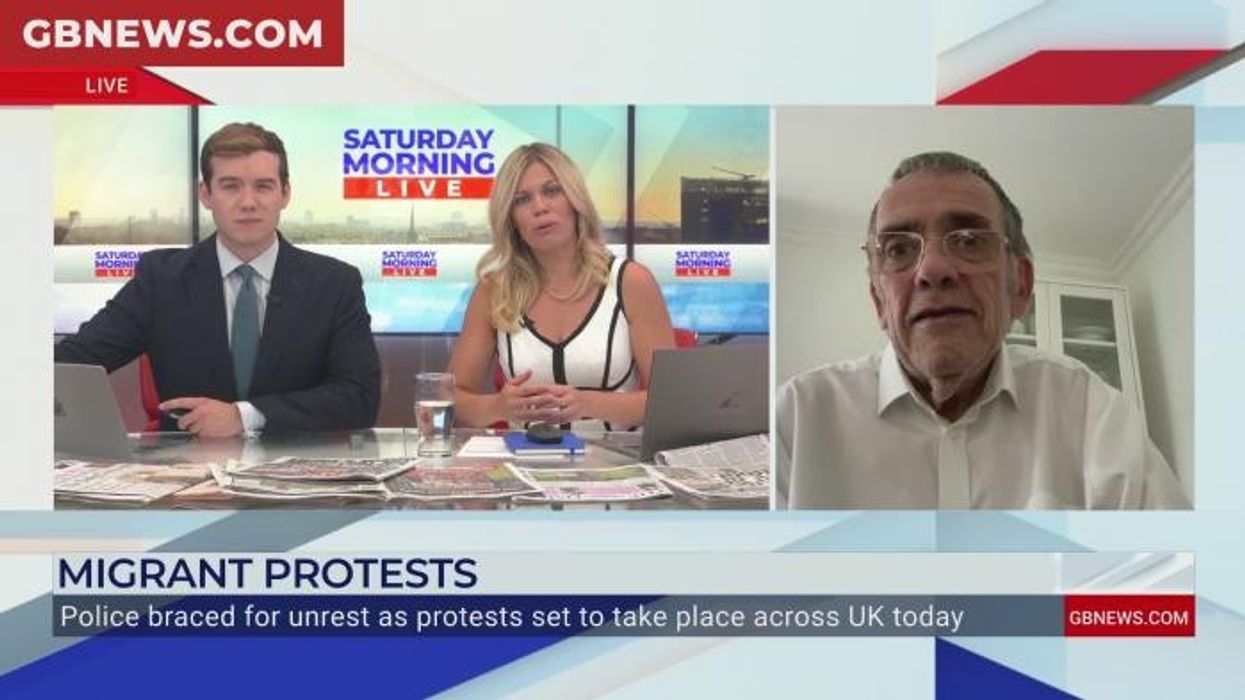Two liberal ideas have made Britain unsafe. We must ditch these shibboleths and make crime pay - Miriam Cates

GB
It is our only hope of reversing recent trends on crime and illegal immigration
Don't Miss
Most Read
Trending on GB News
Two stories just won’t leave the news cycle. Like a pair of broken records, headlines about small boats and prison overcrowding seem to be stuck on repeat.
Last week brought the implementation of the Anglo-French “one in one out” agreement, an arrangement that the Prime Minister hopes will allow British authorities to begin deporting a (very small number) of those illegal immigrants back to France.
On the prisons front, a new report by Dame Anne Owers revealed just how close England’s jails came to breaking point over the last few years.
In practical terms, neither of these problems – cross-Channel illegal migration and overcrowded jails – is difficult to solve.
If every illegal migrant landing on our shores were immediately detained and swiftly deported, crossings would soon dry up. And if the government fast-tracked the building of several new prisons, we could end the perma-crisis in our criminal justice system.
Legally, however, things aren’t so simple. It is now widely agreed that, in order to detain and deport small boat arrivals, Britain would have to ignore or leave a number of international agreements and even amend or repeal domestic legislation such as the Human Rights Act.
Expanding the prison estate would also entail legal reform, most notably changes to planning legislation to enable the central government to override local opposition.
 Two liberal ideas have made Britain unsafe. We must ditch these shibboleths and make crime pay - Miriam Cates |
Two liberal ideas have made Britain unsafe. We must ditch these shibboleths and make crime pay - Miriam Cates | Getty Images
Policy Exchange expert David Spencer told me on GB News Originals that in one instance, even the local police force lodged objections to plans to build a new jail.
Yet even these legal challenges are not insurmountable. Parliament exists, after all, to make, amend and repeal legislation in the best interests of our nation. The true obstacles are neither practical nor legal; rather, they are political and philosophical.
In a democracy like ours, politics is a numbers game. As former Chancellor George Osborne famously said, “The first rule of politics is you've got to learn to count”.
Political parties that want to win power must win a greater number of votes than their opponents.
And governments that want to change legislation must persuade more MPs to vote for their proposals than those who vote against.
Even if Sir Keir Starmer and his Cabinet became personally convinced that leaving the European Convention on Human Rights (ECHR) was necessary to protect our borders, pigs will fly before Labour backbenchers could be convinced to support such a proposal.
Consequently, there is no realistic prospect that we will ‘Stop The Boats’ before the next election. When it comes to alleviating jail overcrowding, perhaps there is a slightly greater chance of success.
On Monday, Home Secretary Yvette Cooper announced that more foreign offenders will be deported rather than languishing in British prisons at the taxpayer’s expense; a small reform perhaps, but a step in the right direction.
But in order to free up funds to build the thousands more prison places Britain needs, Chancellor Rachel Reeves would have to make substantial cuts to other government budgets.
Her recent bruising experience with the Parliamentary Labour Party over benefits reform suggests that Reeves is unlikely to win such a battle.
The public overwhelmingly wants to see an end to illegal immigration and for those who commit crimes to be locked up.
Assuming Labour MPs have an interest in retaining their seats at the next election, why are they so determined not to support stronger borders and a tougher stance on law and order?
The answer lies not in politics but philosophy. For most of British history, the idea that the state should take a soft approach to illegal immigration or crime would have been unthinkable.
Locking up criminals and defending borders was not seen as ‘right wing’, reactionary or ‘hardline’ – these were just basic requirements for a secure and peaceful nation state.
But since the 1960s, liberal doctrines that were previously contained within academia have broken into the mainstream, challenging and now deeply undermining a traditional approach to law and order.
Two liberal ideas in particular have severely weakened Britain’s capacity to protect its citizens. Firstly, liberalism prioritises individual freedom over all other concerns.
Depriving someone of their liberty by imprisoning or detaining them, therefore, becomes morally unjustifiable in almost all circumstances.
The second influential liberal idea is the belief that human nature is essentially good, and so when things go wrong - when individuals murder, steal, rape, or illegally cross a border - external factors must be to blame.
Maybe the criminal had a traumatic childhood; perhaps the illegal immigrant is fleeing persecution.
If an accident of birth rather than individual choice is responsible for a person’s transgression, surely it is unfair to punish them?
Of course, there is some truth in these ideas. It is true that a large proportion of prisoners have led difficult lives, often suffering abuse or neglect as children.
And many of the young men who cross the Channel originate from countries where life is far tougher than here in Britain. And it is true that depriving someone of their liberty should never be taken lightly in a democratic society.
It is right and natural that we should feel human sympathy for people who find themselves detained against their will.
Perhaps because they contain a grain of truth, liberal ideas around freedom and responsibility have become extraordinarily powerful.
In many of our institutions – schools, universities, Whitehall – these ideas now dominate. A well-funded and influential “industrial complex” of charities, lobby groups and lawyers has sprung up to campaign against prisons and border controls.
But while liberal views about law and order may contain a grain of truth, they are not the whole truth.
Governments must balance concerns about individual freedom with the common good of the whole of society.
However compelling an individual’s case, and however much an offender may deserve support and compassion from their friends, family and civil society, the government’s responsibility is to make sure that crime is punished quickly and consistently, so that there is a clear deterrent.
There might be a ‘compassionate’ case for not prosecuting a particular shoplifter, or not deporting a particular illegal migrant.
But the cumulative effect of making exceptions for such a large number of offenders is to effectively decriminalise certain crimes. And when crime goes unpunished, all of society suffers.
No doubt most of those with liberal views on crime are well-intentioned, but their ideas never survive contact with reality.
Despite what liberals believe, human beings are not inherently good. People are capable of great goodness and great evil. But the choices we make are highly dependent on the incentives and disincentives around us.
Much of our behaviour as adults can be explained by how we were raised and whether, as children, we were taught virtues such as self-control and respect for authority.
But an equally important factor in crime prevention is to ensure that society consistently upholds clear boundaries when it comes to law and order.
All citizens should be confident that those who break the law will be swiftly brought to justice, and that the punishment will be determined by the crime committed, and not the personal circumstances of the offender.
Fear of being caught and punished is what stops many of us from breaking the law.
When boundaries are not consistently upheld, chaos always ensues. Why has there been such a sharp rise in shoplifting offences?
Because the last government made the decision not to prosecute anyone stealing less than £200 of goods.
Why do we have more than one million people living in the UK who have no legal right to be here? Because the state has all but given up on deporting those who enter or stay illegally.
Spiralling crime rates have not been caused by a sudden, unexplained deterioration in human nature; the chaos is a direct result of a failure to consistently uphold the law.
That’s why the liberal fondness for being soft on crime is an example of a “luxury belief”; it's easy and cost-free to have ‘compassion’ on offenders if your wealth, status and social connections insulate you from the consequences of rising crime.
But for those whose lives and neighbourhoods are in sharp decline, such attitudes are nothing more than a dangerous thought experiment.
If Britain is to have any hope of reversing recent trends on crime and illegal immigration, our political class must ditch its attachment to liberal ideas that put the interests of criminals over victims, and the rights of illegal immigrants over those of British citizens.
Of course, as individuals we should have compassion and empathy for those who find themselves in trouble; but the job of the state is to punish lawbreaking fairly, firmly and consistently - regardless of the personal circumstances of those who commit crime.










